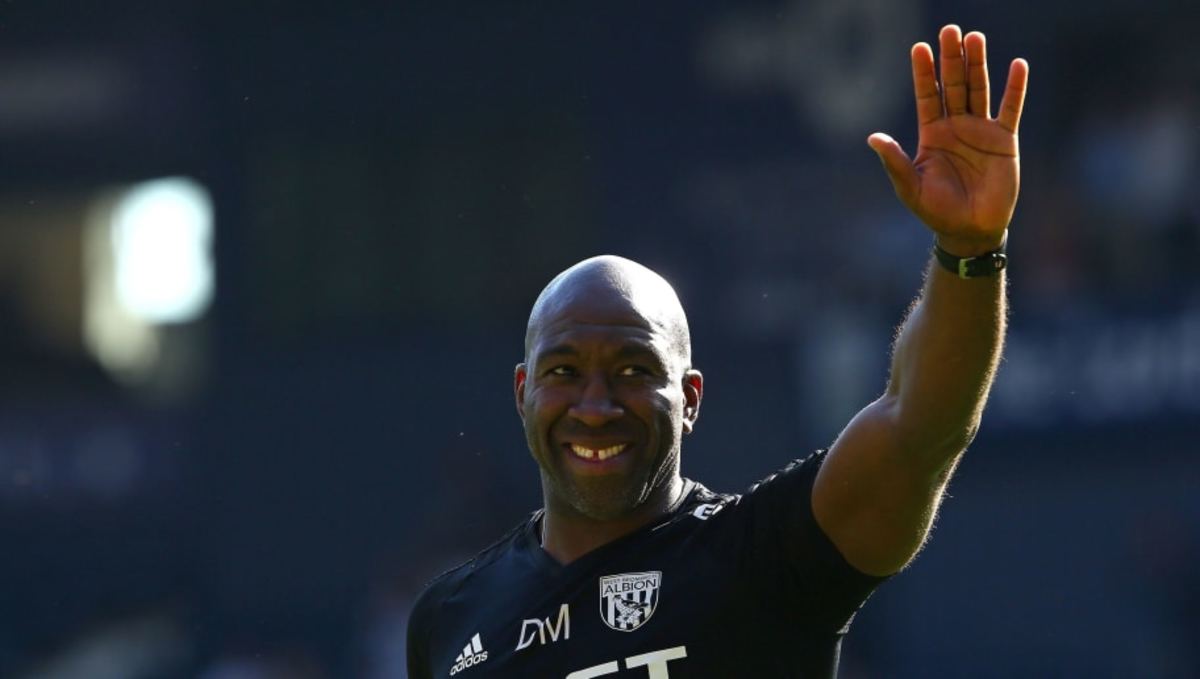An Ode to West Brom's (Almost) Saviour Darren Moore - Hero of the 2017/18 Premier League Season

Sometimes in football, the greatest heroes aren't necessarily the most successful. They don't always even play inspiring or attractive football. There's just something about them, something about the manner of their failure, which in some ways makes them even more admirable than the winners.
Darren Moore, West Bromwich Albion's caretaker manager, is one such hero.
Of course, we mustn't get carried away here. In a season in which Pep Guardiola's Manchester City broke a whole list of records, and Sean Dyche led Burnley to Europa League qualification, Moore (who helmed just six league games) can hardly be considered a contender for Manager of the Year. Even by the standards of a country which has always celebrated plucky underdogs and glorious failures, giving the award to the coach of the Premier League's bottom club would border on the ridiculous.
Yet there is one crucial difference between Moore and the likes of Guardiola and Mourinho. The Baggies boss was given a mission which, to all intents and purposes, looked impossible - and still he came remarkably close to pulling it off.
I had the privilege of reporting on his side's astonishing 1-0 triumph over Manchester United at Old Trafford - a win which the visitors fully deserved, even though they rode their luck at times. There was an air of sluggishness and complacency about the Red Devils, who seemed genuinely surprised that the bottom club actually competed with them and refused to capitulate.
To be fair to United, they could hardly have been blamed for expecting an easy match. After a poor start to the season which cost Tony Pulis his job as manager, the Baggies' form went from bad to worse under Alan Pardew.
After earning a 1-1 draw away to Everton in January, West Brom went on a run of eight successive league defeats, before Pardew suffered the same fate as Pulis. Even Moore's first match in charge - a scrappy 1-1 draw with relegation rivals Swansea City - gave no indication of the incredible exploits which would follow.
Between the Swansea draw and Sunday's 2-0 defeat at Crystal Palace (after the Baggies' relegation had already been confirmed), Moore's side defeated Manchester United, Newcastle United and Tottenham Hotspur - as well as fighting back from 2-0 down to draw with Liverpool at the Hawthorns.
Moore didn't come up with a magical tactical formula. Nor did he inspire his side to produce scintillating football, although it was still light years ahead of the insipid dross served up under Pardew. Yet what he achieved was, in its own way, a kind of alchemy - he seemed to inspire his players to take pride in their performance, play as a cohesive unit and actually care about their club.
And yes, of course highly-paid professional footballers should never have needed their manager's inspiration to do any of these things - which is why West Brom's late-season heroics under their caretaker manager must seem bittersweet for Baggies fans. They must be wondering why on earth their players seemed to go AWOL when there was still a realistic chance of survival.
By the time Moore took over, West Brom already knew they needed numerous other results to go their way if they were to have even a fighting chance of staying up. In a way, it was appropriate that the killer blow came not from a West Brom failure, but from a result over which they had no control - Swansea's home defeat against Southampton.
West Brom more than fulfilled their part of the bargain under Moore. It was the other results which ultimately let them down.
But does Moore deserve so much credit for his side's excellent unbeaten run? Some might argue that West Brom merely enjoyed a classic 'new manager bounce', and that sheer desperation inspired them to raise their game. In other words, Moore's role was merely incidental.
Yet there was no bounce under Pardew after he'd replaced Pulis, while the threat of imminent relegation clearly didn't inspire either Swansea or Stoke City to achieve the kind of heroics which Moore's side managed against far more illustrious sides.
Of course, it's also possible that West Brom played with greater freedom under Moore because their chances of survival were so remote - in other words, they had nothing to lose by just going for it. Again, however, it was by no means inevitable that the players would respond so positively. They could just as easily have slid into apathy, like Paul Jewell's abject Derby County side in 2008.
Whether or not Moore is appointed as the Baggies' next permanent boss, his side's glorious but ultimately doomed bid for survival should never be forgotten - and not just because they picked up seven points out of a possible nine against three of the Premier League's top four sides.
In the short and unlamented Pardew era, the club's reputation took serious knocks both on and off the pitch. Their season's most embarrassing moment arguably took place not on an English football ground, but in Barcelona, where four West Brom players - including captain Jonny Evans - allegedly stole a taxi to go back to their hotel, leaving the taxi driver behind.
Under Moore's stewardship, his players have acted with far greater dignity and professionalism than that, and the Midlands club has regained much of the pride and respect which had been lost earlier in the season.
Even after a likely exodus of star players this summer, West Brom can look forward to next season with far greater optimism than would ever have been possible without Moore. For that alone, the Baggies will always owe him a debt of gratitude.






